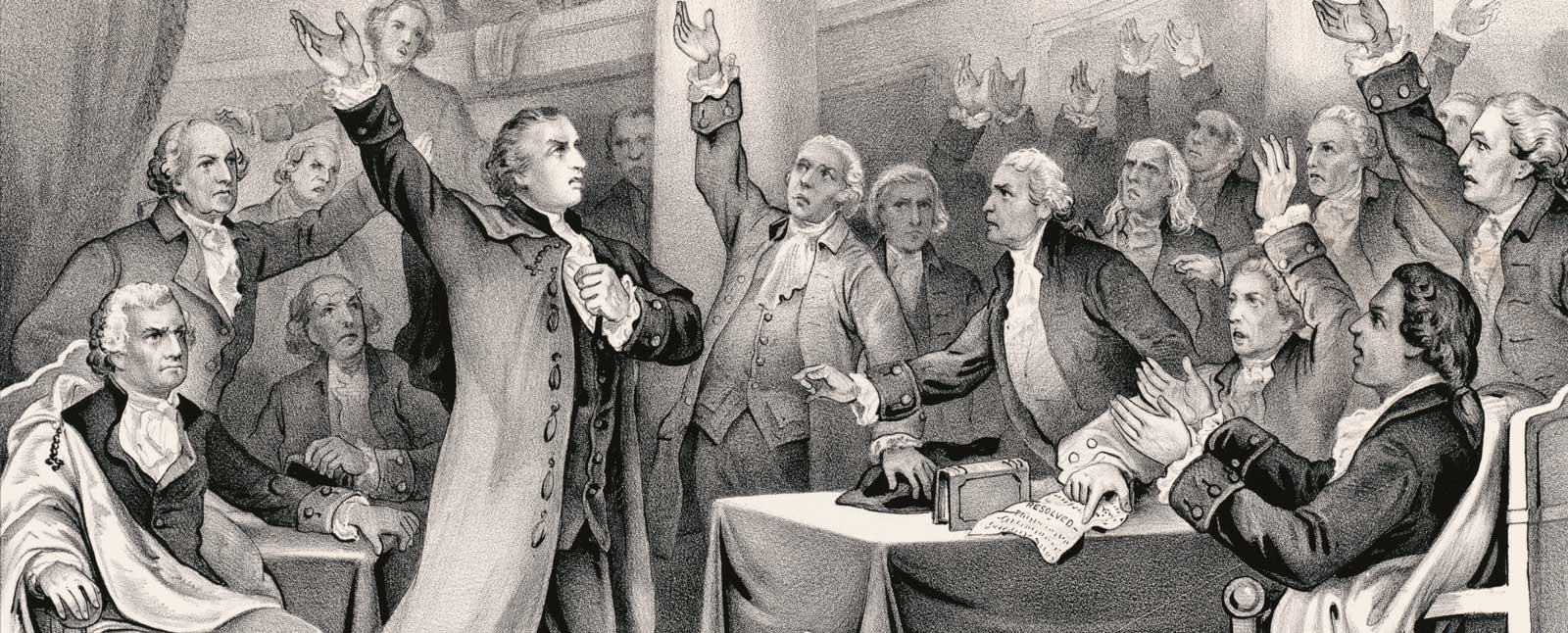What Form of Government did the Constitution Create?

Today most Americans are in the habit of referring to our form of government as a democracy, but in Article IV, Section 4 of the Constitution we read the following: “The United States shall guarantee to every State in the Union a Republican Form of Government,…” Were we to ask Americans to explain what they mean by democracy, we might find some confusion, or perhaps a general sense that democracy involves voting for candidates on the basis of promises made to do one thing or another, or perhaps even the lofty-sounding but incorrect assertion that in our democracy, “we the People” are the government. If we then asked for a description of a republic, we’d likely be met with similar confusion or vague notions that suggest an idea of what a republic is, but no certain understanding of it. Interestingly, if we could travel back to 1788/89 when the Constitution of the United States was ratified, we’d find a similar situation in which people knew what they wanted for their own lives and for those of family and friends, but of the best form of government for a free people there would be differing ideas about it, but the general sentiment would have been: “Protect our country from invasions from without, from criminals within, and beyond that, leave us alone.” Nevertheless, Americans were called upon to consider in state conventions whether to adopt the Constitution drafted in Philadelphia in the summer of 1787. We might then ask about the form of government Americans thought they were adopting in the new Constitution.
As much as Americans will call our government a democracy, we tend also to speak of the “Founding Fathers” as if they were a band of likeminded visionaries on the trail of a unique experiment in liberty. However impressive many of them were, they were also, like us, human, with the ambitions and schemes for achieving them that are common to human nature. For example, in 1781 the Articles of Confederation and Perpetual Union, our first Constitution, went into effect. Many people including Alexander Hamilton and James Madison did not like the Articles because the Articles affirmed a confederation of sovereign states with a weak unicameral legislature, often called the Confederation Congress, with no executive branch and no courts. Regarding courts, the general idea had been that each state has courts, so the confederation does not need them. Moreover, creating such courts would likely ignite a struggle for power between the states and the general government conducted largely by judges of the general government seeking to expand their power using strained and fanciful “interpretations” of the basic law. Instead, the Articles of Confederation contained a process of mediation for working out disputes between and among states. Moreover, the general government could not tax, relying instead on raising revenue by asking the states for money, but lacking any means to compel compliance. For many Americans, this arrangement worked fine because it accomplished the limited purposes for which the Confederation Congress was created, but kept it weak enough to preserve the sovereignty of the states. For many other Americans, this is precisely why the Articles had to be abolished and replaced with a stronger centralized government of truly sovereign authority. We have many examples of this ambition including the Virginia Plan for a new government proposed at the Philadelphia Convention of 1787 that included among its provisions authority in the new government to veto state laws. Madison pushed this idea repeatedly, and was repeatedly and firmly rebuffed. The reason had to do with sovereignty. If sovereignty may be understood as the authority to act without the permission of another, Madison’s veto of state laws would have destroyed the sovereignty of the states, reducing them to administrative districts of the central government, able to enact only those laws for which they have approval from the center. Madison confided to Thomas Jefferson in several letters that this veto power in the central government was the one provision he most wanted in the new Constitution. So we find even before the Constitution was written political divisions among Americans that produced a tension that led to war in 1861.
Today, when one reads accounts of why the Articles of Confederation were replaced with the Constitution the story is generally that the Articles established a general government that was too weak to protect the states from aggressors, whether at home or abroad. However, this was but one of the arguments made by people we may rightly call “nationalists” because they wanted a national sovereign authority for the United States rather than a decentralized federation of sovereign states. These people, who included Alexander Hamilton, James Madison, Benjamin Franklin, and George Washington, contended that only a national government can achieve power sufficient to protect America, but the idea of government they wanted was not acceptable to many other Americans. Those Americans, who included Thomas Jefferson, George Mason, Patrick Henry, and Samuel Adams, held that we Americans fought a war to throw off the heavy hand of the British state, so it would be a tragic end of our liberty to create a version of that state here. This is why Thomas Jefferson would refer to Alexander Hamilton as a monarchist, not because Hamilton wanted to establish a king, but because he wanted to create a single locus of national power. In an interesting maneuver that is surprisingly contemporary, the nationalists took to calling themselves “federalists,” since federalism was so popular, and the actual federalists they called “anti-federalists.”
Thomas Jefferson wrote to a friend saying that a democracy was the only pure republic, but impracticable beyond the limits of a town. The image here was that of a New England township in which people would come together to discuss among themselves how to order their common life. In this arrangement, the citizens of the town directly apply the energies of government to the needs of the community, which Jefferson called “democracy.” Of course, we can easily see how this kind of self-government can only work in a small polity of comparatively few people (which is why it is always silly to talk of the need of a “national conversation” in which, one supposes, the voices of 330 million people will be “heard”). Writing to John Taylor of Caroline County, Virginia, Jefferson asserted that the word “republic” is a “very vague application in every language,” but offers what he calls a precise and definite idea of it. For Thomas Jefferson, a republic is “…a government by its citizens in mass, acting directly and personally according to rules established by the majority; and that every other government is more or less republican in proportion as it has in its composition more or less of this ingredient of direct action of the citizens.” He goes on to say that in such a government the real authority should be held in towns and localities where people live their lives together, what Jefferson often called “ward republics,” and that the further from the people in localities a government entity is, the fewer and more general should be its powers.
James Madison offers definitions of a republic in numbers 10, 14, and 39 of the Federalist. Madison repeatedly discusses his concern for the damaging effects on society of “faction,” that is the division of citizens into parties bound together by interests that are often at odds with those of other parties. Curiously, Madison asserts that we grow in the ability to control the effects of faction as a government expands over an ever larger territory. Thus he writes: “Hence, it clearly appears, that the same advantage which a republic has over a democracy, in controlling the effects of faction, is enjoyed by a large over a small republic—is enjoyed by the Union over the States composing it.” [Federalist 10]
Here we see the primary political tension animating Americans in the late 18th century: The role of government in society. Is government just only to the extent that it protects the lives, liberty, and property rights of individuals (Jefferson), or should government be larger and more robust, able to regulate commerce at home, and to advance our perceived interests abroad (Madison)? The Jeffersonian vision of government holds power to be held at the local-most level because he found sovereignty to lie in people not institutions. Thus Jefferson defended the right of people in the states and closer to home to nullify laws they detested and, if this expedient failed, to secede from the offending political order (let us be clear, the Declaration of Independence is a secessionist document). The Madisonian vision of government sees power used most beneficially in a centralized government, which for the nationalists was the proper locus of sovereignty. This would mean, of course, that states and localities would have no authority to nullify federal laws, and secession would be out of the question. (It is often observed that there are several James Madisons, for example, the nationalist advocate of a centralized state in his writings in the Federalist, and the eloquent defender of local autonomy in the Virginia Resolutions of 1798.) So the Americans who maneuvered the states into the Philadelphia Convention wanted to craft a Constitution that would establish a central government, a nation-state, to replace the confederation of sovereign states that existed at the time. But more Americans at the time preferred a federation of sovereign states. What emerged from Philadelphia and was ultimately ratified in the states was a constitution that established a federation of sovereign states, fortified with a bicameral legislature, an executive branch, and a supreme court. In short, the federalists succeeded in preserving a federal republic, and the nationalists successfully replaced the Articles of Confederation with a constitution structurally adequate to the centralization of state power into the federal government, thus ultimately to become the nation-state they wanted.


